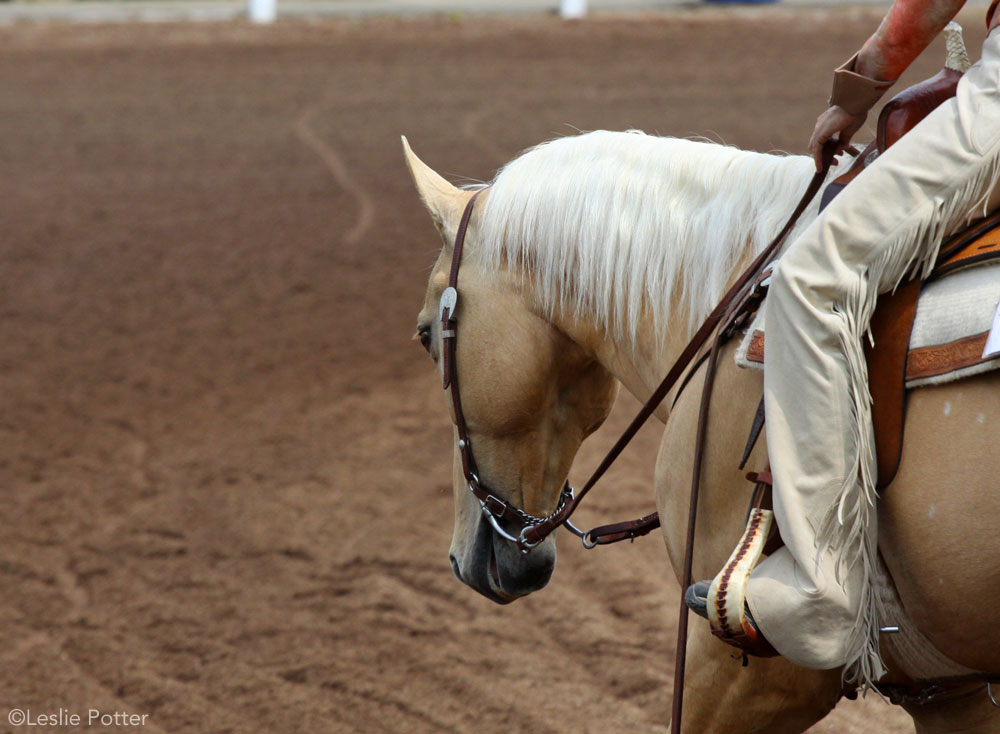Western Lesson: Fast No More




This constant quest for speed can mean that your horse is high-headed and ready to take off when you simply want to walk. Riding a horse that is amped up and tense isn’t fun when you want to relax, or would like to enter a slower-paced rail class at a show.
You can help reduce your horse’s anxiety and teach him that walking slowly on cue is the right answer. Your horse should travel at the rate you request—calm and slow when you ask, and faster when you cue him for speed. Read on to find out how.
Speed Events – Why so Fast?
Your horse may think that going fast is the right answer, especially in a speed event. If your horse was trained for speed events in a high-pressure setting, he may think that stepping into an arena means speeding up. Learning how to slow down your speed event-trained horse can be beneficial to you when you need a calmer ride in the arena.
Not all speed-event horses are trained this way, but with repetition, horses can quickly associate arenas with high pressure and speed. When a horse has had high-pressure training, sometimes he’ll associate the arena with anxiety—resulting in too-fast gaits, prancing, jigging, and high-headed movements.
Slow Down Your Horse – A Different Way
Teach your too-fast horse that there’s another way to act when he enters the arena:
- Outfit your horse in his usual tack.
- Riding with two hands on the reins (for more control), ask your horse to enter the arena at a walk.
- Make sure your reins are loose, but that you can pick up contact easily if your horse speeds up.Note: Resist the urge to change to a severe or bigger bit to slow down your horse. A harsher bit can cause more anxiety for your horse. You want to teach your horse to slow down because of your cues, not because of your tack. If you worry that your horse will take off with you, ask a trainer for help as you start the slow-down process.
- If your horse picks up the pace on his own or steps into the trot, pull back on the reins to correct his speed.
- As soon as he returns to a walk, make sure to loosen the reins again. Allow slack in the reins and put your knuckles on the horse’s neck when he’s walking nicely with his head down. Feeling your hand on his neck shows the horse that you are relaxed and not asking more of him.
- With good timing (correct your horse within one or two seconds of any unauthorized speed up) and an immediate release of rein pressure when he does slow down, your horse will learn that he’ll be rewarded for going slow.Note: Riding with constant pressure on the reins can make your horse more anxious and cause him to lean against the pressure—moving faster and with anxiety.
You’ll teach your horse to think, “How can I get my rider to lengthen the reins?” He’ll learn that moving slowly and putting his head down in a relaxed fashion is the way to avoid rein and bit pressure.
Bend, Relax, and Slow Down
A horse will be more relaxed when he bends his neck. He’ll know that he’s following your direction and that his job isn’t to move straight ahead at high speed. As you warm up, turn to the right then the left, moving forward but constantly changing directions. Your horse will tune in to you and stop searching the scenery for something to be worried about.
Once your horse is walking at the pace you want, practice rating your horse’s speed at the trot. Keep in mind that if your horse is already fast, you won’t need to cue with much pressure. Sit up tall and think about the trot and your horse will likely speed up without leg pressure.
If your horse puts his head up as you’re trotting, softly close your legs against his sides and apply rein pressure. When he lowers his head, loosen the reins and relax your legs. As soon as your horse lowers his head, loosen your reins. If your horse speeds up too much, pull back abruptly to stop. Wait for a count of three then start practice again.
Practice your slow-down cues and your constant turns at the walk and trot. Just as your horse once associated the arena with speed, he’ll learn to associate your loose reins and knuckles on his neck with a time to be slow and calm. Make your cues clear and consistent and you’ll soon have a horse that can tune in to you and go at the pace you choose.
This article on how to slow down your speed event-trained horse originally appeared in the March/April 2018 issue of Young Rider magazine. Click here to subscribe!
Recent Posts
How a Horse Girl Stayed Horsey Despite Not Riding for Years
After growing up horsey, Nancy still held on to her identity as a “horse girl” even when she hadn’t ridden…
Barn Banter – Episode 29
Welcome to Barn Banter, the official podcast of Horse Illustrated. In Barn Banter episode 29, hosts Susan Friedland and Horse Illustrated…
How the Nurse Mare Industry is Changing for the Better
The nurse mare industry has been a source of controversy over the years, but practices are changing—meaning a better outlook…
Practical Horse Care: Four Must-Have Products for Every Equine Owner
Horse ownership comes with incredible rewards: the thrill of a pleasure ride, the camaraderie of competition, and the deep bond…
Brain Games: Equestrian Neuroscience
By tapping the power of neuroscience and the miracle of brain plasticity, spending just a few minutes a day practicing…
A Look Into the SAFE Act
The U.S. horse slaughter industry is as hot-button an issue as there is. Find out where current legislation stands with…